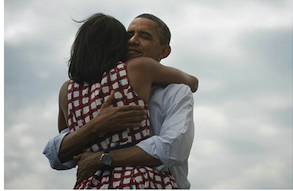As presidential election day unfolded on Tuesday,people spent time posting photos of long lines at polling places,tweeting about casting a vote and commenting on a viral video of a malfunctioning voting machine.

Obama victory tweet
This year marked the first national election since social networking went mainstream.
"I think social played a huge role in the election,"said Zeus Kerravala,an analyst at ZK Research.
"In the past it was difficult for anyone not on TV to provide opinion broadly.Now everyone can.Twitter lit up the day before and the day of the election with people giving opinions on everything from legalizing pot to who to vote for,"he said
Election day was a huge one for Twitter,proving CEO Dick Costolo to be a bit prescient.
Early this year,Costolo predicted that Twitter would play a critical role in the 2012 presidential election,proclaiming that"I really think 2012 is going to be the Twitter election."
There was a lot of focus on Twitter during the primaries and in the months leading up to the general election.Twitter was very widely used during the presidential debates and on election day.
Some 31 million tweets were posted on Tuesday,according to the micro-blogging site.Twitter hit a peak of 327,452 tweets per minute last night just after the national news networks began calling the election for President Barack Obama.
Soon after Obama won re-election for a second term,the president sent out his most retweeted post ever--a photo of him hugging his wife.Shortly thereafter,more than 455,000 people had retweeted it.
U.K.Prime Minister David Cameron tweeted,"Warm congratulations to my [email protected] forward to continuing to work together."In another tweet,Australian Prime Minister Julia Gillard said,"My sincere congratulations to President@BarackObama on your re-election!JG"
Meanwhile,Facebook wasn't left out of the political mix yesterday.
People spent much of Tuesday posting Facebook updates noting that they had voted,what the lines at polling places were like and getting in last-minute digs at the candidates they didn't like.
The social network itself actively engaged with users,offering up a message at the top of peoples'News Feed,reminding them it was election day and to get out and vote.The message also contained a link to the Facebook Polling Place Locator,an app that listed users'local voting sites.
Now that the election is over,some people will be able to refriend people they had blocked online because of differing political views.
"The general rule of thumb in"social"settings is to not discuss politics or religion.We crossed that line in a big way,"said Kerravala."It came to a crescendo this week.The volume was nuts."





